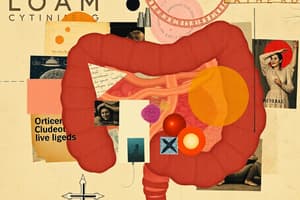Podcast
Questions and Answers
What is the role of hydrochloric acid in the activation of pepsinogen?
What is the role of hydrochloric acid in the activation of pepsinogen?
- It inhibits the secretion of pepsinogen by the chief cells.
- It changes the conformation of pepsinogen in the stomach environment. (correct)
- It directly converts pepsinogen into pepsin.
- It neutralizes the stomach environment for pepsinogen activation.
What type of peptide bonds does pepsin primarily cleave?
What type of peptide bonds does pepsin primarily cleave?
- Peptide bonds containing a basic amino acid.
- Peptide bonds containing a polar uncharged amino acid.
- Peptide bonds containing a sulfur-containing amino acid.
- Peptide bonds containing a carboxyl group from an acidic or aromatic amino acid. (correct)
What happens to dietary proteins in the presence of gastric acid?
What happens to dietary proteins in the presence of gastric acid?
- They are denatured and partially unfolded for easier proteolysis. (correct)
- They are protected from proteolysis by gastric acid.
- They are converted into pepsinogen for digestion.
- They are broken down into free amino acids by pepsin.
Where do the smaller peptides and free amino acids go after encountering peptidases?
Where do the smaller peptides and free amino acids go after encountering peptidases?
Flashcards are hidden until you start studying




